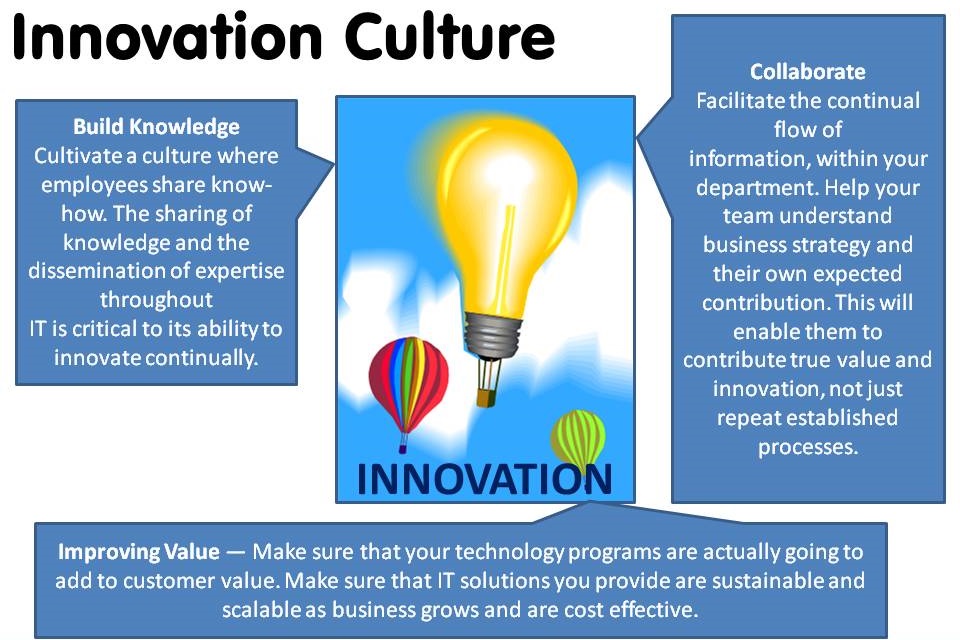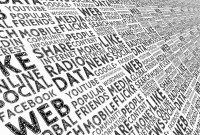- Home
- Business Processes
- Industry Knowledge
- Aerospace Industry
- Automotive Industry
- Banking Domain
- BFSI Industry
- Consumer/ FMCG Industry
- Chemicals Industry
- Engineering & Construction
- Energy Industry
- Education Domain
- Finance Domain
- Hospitality Domain
- Healthcare Industry
- Insurance Domain
- Retail Industry
- Travel and Tourism Domain
- Telecom Industry
- Leadership Skills
- eLearning
- Home
- Leadership
- Change Management
- Change & Culture of Innovation
Change & Culture of Innovation
Predicting the future is a tricky business but managers need to have a future perspective in order to take business advantage and remain competitive. They need to drive and introduce constructive change to the business of the enterprise. The first step to creativity and innovation is to drive a culture of Innovation. Managers need to focus on developing future mindset all the time to keep pace with the unfolding future.
One needs to have some broad awareness of whether the future is tending.
Changing Customer Needs
There are thousands of services, from the provision of spectacles to the development of your holiday plans, where the customer wants instant results. The industry-wide waiting time is fast reducing from days and hours to minutes. A conceptual shift is needed in the manager’s mindset to drive change toward getting as close as possible to an immediate meeting of the customer's needs.
Response time is getting better in the banking industry. Most banks provide the facility of instantaneous account debiting by automatic tellers at any time of day or night. In Manufacturing industries, the time value of information is gaining respect, and monitoring of the production line is in real-time. Service industries are trying to answer a business query immediately which is in turn, beneficial for both the customer and the provider. Computer-aided design and development is enabling the culture of straight to production and consumption. Innovation is constantly driving change across all industries.
Anyplace Customers want the service where they want it. They don't just want it where the supplier thinks it's convenient to hold it. They want it at anyplace. Already there are plenty of examples of this. Mobile has replaced so many gadgets like phone, pocket calculators, camera, heart monitors, step trackers, computers and desktops, etc. Earlier we would have had to go to the office to use a desk one for sending emails. Month by month the number of people who carry the phone around with them is growing, and they no longer have to go to where the phone is. They practically wear it. Portable computers of the lap variety enable business people to do their spreadsheets on the plane; home entertainment systems are now designed for self-assembly, so that you no longer have to wait for the technician but within an hour of purchase you are enjoying the fruits of your investment, having taken it home in two or three boxes in the car.
The customers today do part of what would previously have been done at the factory. The manufacturing chain of the goods and services ends in the hands of the consumer in their own physical space. Those who provide goods and services in a real-time gain a competitive edge over those who don't there is no time lag between the identifying of a need and its fulfillment.
Technology is Unfolding Future
The technology is there. It is simply that managerial thinking hasn't caught up with it. This is where future mindset comes in, developing all the time to keep pace with the unfolding future. The ability to provide the product in any place is facilitated by the advancement in electronics, whereby a million electronic components can be placed on a quarter of inch square of smelted sand. The information carried by electrical impulses demolishes space as well as time so as enables the customers to enjoy both benefits. No doubt all these innovations brought a lot of unwelcome change to those who preferred the status quo, but those with the future mindset like Apple, Google, and others not only survived but prevailed and emerged as winners.

Concept of Anytime Anyplace
There always existed an interrelationship between physics and management. Both physics and management are concerned with "the interrelationships of the parts with a whole". Time, space, and matter are fundamentals of physics, as equally fundamental to the shaping of tomorrow's business and organizations. The first dimension of physics which links with business needs is time. As we respond to and persuade customers, they use time until they decide to buy. Then we deliver, we are using theirs. We have to shorten the elapsed time between their decision and the fulfillment of their need. The customers want the product of service when they want it, not when the company deigns to provide it. They want it any time, and as explained above, technology already provides many examples of meeting this need.
These concepts of any time and any place are changing the way organization operates:
- It is becoming less significant where you work. Half of the world was working from home during the recent COVID-19 pandemic
- The number of home workers is on the increase, with the ultimate benefit to transport problems as the people working away on their computers.
- The human association is provided by the increasing speed of network connectivity
- Decentralization is happening, which is after all about the place
- As people work in networks, less dependent on space, so headquarters building is less inhabited and organizational hierarchies flattened
- Middle managers find a new place between the producers and the customers, instead of between the senior managers and the supervisors.
Building Innovation Mindset
Managers need to focus on building innovation culture by facilitating collaboration across organizations, building the breadth and depth of knowledge, and improving the value that any function provides to the business. They need to facilitate the continuous flow of information, within their departments. Help their team understand business strategy and their own expected contribution. This will enable them to contribute true value and innovation, not just repeat established processes.
Cultivate a culture where employees share know-how. The sharing of knowledge and the dissemination of expertise throughout the organization is critical to its ability to innovate continually. Make sure that your change initiatives and programs are actually going to add to customer value. Make sure that solutions are sustainable and scalable as the business grows and are cost-effective.
Related Links
You May Also Like
-
Facilitative Leadership is all about involving the employees in the decision-making process at all levels enhancing their sense of ownership, responsibility, and motivation. Facilitative leadership style uses a number of indirect communication patterns to help the group reach consensus and build commitment for the decision taken. To be effective in modern organizations, managers need to become facilitative leaders, learn what it means to be a one.
-
Stress is a product of the busyness of modern life. It has assumed grave dimensions ever since the emergence of industrialism. In fact, stress is a natural, ongoing, dynamic, and interactive process that takes place as people adjust to their environment. Stress can be brought about by positive or negative life events. Distress can cause disease and eustress or positive stress can promote wellbeing and increased productivity. Learn to recognize and be responsible for your stress, and learn the ways to manage stress.
-
We define Lean as the systematic elimination of waste through a continual effort to decrease inefficiency; the lean leader strives to create a more efficient organization. Lean leadership is a philosophy. It is a consistent way of thinking and being in your role as a leader. The focus of this approach is on raising new leaders and help their team embrace a culture of continuous improvement. Learn what we mean by lean leadership style and its principles.
-
In today's innovation-driven economy, understanding how to generate great ideas has become an urgent managerial priority. Managers need to encourage and champion ideas and need to help their organizations incorporate diverse perspectives, which spur creative insights and facilitate creative collaboration by harnessing new technologies. Innovation is the embodiment, combination, and/or synthesis of knowledge in original, relevant, valued new products, processes, or services.
-
Change & Culture of Innovation
Predicting the future is a tricky business but managers need to have a future perspective in order to take business advantage and remain competitive. They need to drive and introduce constructive change to the business of the enterprise. The first step to creativity and innovation is to drive a culture of Innovation. Managers need to focus on developing future mindset all the time to keep pace with the unfolding future.
-
Reasons behind Wastage of Time
Under-utilization of time may be due to the faulty system or faults of manager/officer/leader or due to lack of planning. There could be many factors driving the procrastination behavior like system issues, personal work habits, and lack of delegation, personality traits, and bad working habits of the leader, failure to tackle interpersonal conflicts, obstacles, and lack of far-sightedness.
-
How often do you have a plan for how you are going to spend your day but you aren't able to complete the tasks on your plan because of unimportant tasks, interruptions, or your own procrastination? Wouldn't it be great to be able to manage your schedule and your time while avoiding, or at least controlling, these time stealers? Learn the strategies to manage your schedule while still handling interruptions and demands on your time.
-
Technological advancement has brought about radical changes in the methods of work and also in the organizational structure and talent strategies. The future of work is transforming our work, workforce, and workplace. Some important trends observed during recent times are discussed below.
-
In its simplest sense, decision-making is the act of choosing between two or more courses of action. Decision making is a key skill in the workplace and is particularly important if you want to be an effective leader. When decisions have to be made, there are several stages that you should go through to reach a practical solution. Understand the meaning and importance of decision making and how to look at it as a process.
-
At different points in your professional career, it is helpful to identify your core values. Values are the qualities considered to be the most important guiding principles that determine the priorities in your life and greatly influence your career choices. Your career brings happiness when it is in agreement with the beliefs you have about what is important and meaningful to you. Awareness of your values will help you develop a clearer sense of what's most important to you in life.
Explore Our Free Training Articles or
Sign Up to Start With Our eLearning Courses

About Us
Learning
© 2023 TechnoFunc, All Rights Reserved










